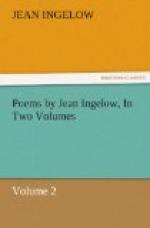ON THE BORDERS OF CANNOCK CHASE.
A cottager leaned whispering by her hives,
Telling the bees some news, as they lit
down,
And entered one by one their waxen town.
Larks passioning hung o’er their brooding wives,
And all the sunny hills where heather thrives
Lay satisfied with peace. A stately
crown
Of trees enringed the upper headland brown,
And reedy pools, wherein the moor-hen dives,
Glittered and gleamed.
A
resting-place for light,
They that were bred here love it; but they say,
“We shall not have it long; in three
years’ time
A hundred pits will cast out fires by night,
Down yon still glen their smoke shall trail its way,
And the white ash lie thick in lieu of rime.”
AN ANCIENT CHESS KING.
Haply some Rajah first in the ages gone
Amid his languid ladies fingered thee,
While a black nightingale, sun-swart as
he,
Sang his one wife, love’s passionate oraison;
Haply thou may’st have pleased Old Prester John
Among his pastures, when full royally
He sat in tent, grave shepherds at his
knee,
While lamps of balsam winked and glimmered on.
What doest thou here? Thy masters are all dead;
My heart is full of ruth and yearning
pain
At sight of thee; O king that hast a crown
Outlasting theirs, and tell’st of
greatness fled
Through cloud-hung nights of unabated rain
And murmurs of the dark majestic town.
COMFORT IN THE NIGHT.
She thought by heaven’s high wall that she did
stray
Till she beheld the everlasting gate:
And she climbed up to it to long, and
wait,
Feel with her hands (for it was night), and lay
Her lips to it with kisses; thus to pray
That it might open to her desolate.
And lo! it trembled, lo! her passionate
Crying prevailed. A little little way
It opened: there fell out a thread of light,
And she saw winged wonders move within;
Also she heard sweet talking as they meant
To comfort her. They said, “Who comes to-night
Shall one day certainly an entrance win;”
Then the gate closed and she awoke content.
THOUGH ALL GREAT DEEDS.
Though all great deeds were proved but fables fine,
Though earth’s old story could be
told anew,
Though the sweet fashions loved of them
that sue
Were empty as the ruined Delphian shrine—
Though God did never man, in words benign,
With sense of His great Fatherhood endue,
Though life immortal were a dream untrue,
And He that promised it were not divine—
Though soul, though spirit were not, and all hope
Reaching beyond the bourne, melted away;
Though virtue had no goal and good no scope,
But both were doomed to end with this
our clay—
Though all these were not,—to the ungraced
heir
Would this remain,—to live, as though they
were.




